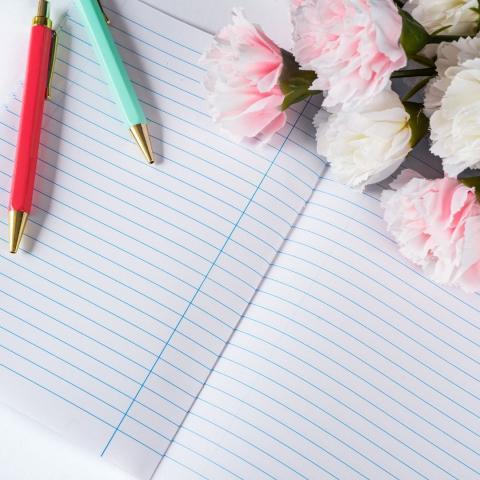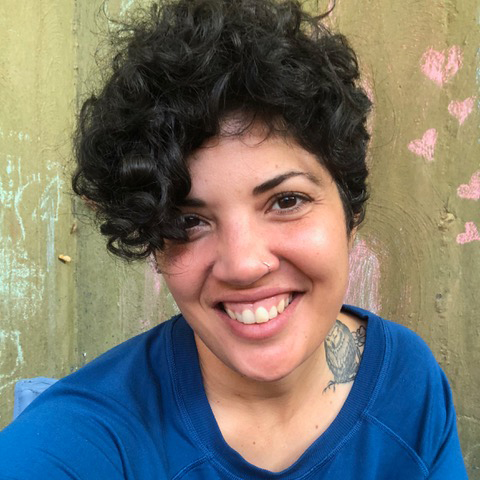
Recently, I had the pleasure of teaching a one-hour virtual introductory class on writing through trauma for nonfiction writers as a part of the Indiana University Writer’s Conference. As an interactive feature of the conference, writers and instructors were able to conduct polls regarding their classes.
I asked several questions of my participants. One was whether or not respondents had intentionally written through trauma, to which 28 out of 32 respondents said yes. My follow-up question speaks to the heart of Writing through Trauma to Truth, the trauma writing course I teach here at the Center. I asked whether writers knew to perform a written self check-in after trauma writing. Of 21 respondents, eight said no.
What is checking in?
Let me back up. What do I mean by “checking in?” A check-in is a private conversation with yourself, preferably on paper; it’s giving yourself the opportunity to take stock of the highs and lows of your writing experience. Simply put, checking in is a self-care best practice that might be helpful no matter what you’re writing, but is especially important for writers who are tackling difficult, triggering, or traumatic subjects in their work.
I was alarmed that nearly half of poll respondents for my trauma writing course did not know to do it, so I wanted to offer three reasons why checking in makes safer the practice of writing about unsafe experiences.
Why should I be checking in?
Check-ins provide emotional clarity. A big part of writing trauma is, well, big feelings. When using expressive writing to get your thoughts out, you might abandon writing boundaries and let your emotions lead. This often means you experience multiple emotions—a jumble that can be hard to parse immediately following a writing session. High emotional energy can lead to confusion and stress. Asking yourself how you feel after writing something painful means you can more mindfully process and recover from that writing.
Check-ins ground us. The most common question I receive about trauma writing is how to ground yourself afterward. While lying on the floor is an excellent (and literal) option, first determining which emotions need grounding allows you to take those feelings with you and ease them into pause. Checking in with one’s self after writing helps soften the raw edges of vulnerability. It brings us back to the safe present.
Check-ins let us know what to expect the next time we write. Possessing this knowledge means we can plan for our next writing session. With your emotional energy quieted, you can now determine what aspects of the writing you need to return to, and which aspects, for your own safety, you should avoid. Review your self check-in prior to writing again to prepare yourself for new and returning emotions. By doing so, the writing process will gradually become easier as you will know what to expect from the process and can better prepare for approaching those hard topics again in the future.
So how do you check in, anyway?
After a writing session, pull out a journal or open a new, blank document, something separate from the writing you just completed. Take a few deep breaths to center yourself, then start with a head to toe sweep. Moving slowly, take note of how you feel at different points on your body. Are you clenching your jaw? Is your neck stiff? Is your heart beating fast? Does your lower back ache? We carry all our experiences, all our emotions and stressors, in our physical bodies. Where do you carry yours? Take notes.
Next, be honest with yourself about how you feel. While most of the writers I work with feel catharsis when writing their trauma, some do feel worse. Know that this is okay. Again, trauma writing is a vulnerable act that brings up raw emotions. Bad feelings are a part of trauma. If you experience a negative response even after your check-in, bring your writing to your therapist or trusted friend. Talk with them about what you are experiencing. Trauma writing couples with therapy beautifully. Whether you feel relieved, purged of the trauma after writing, or flooded with emotions in the wake of revisiting a difficult incident, write it down.
Can you make any connections between the physical and emotional responses you’ve recorded? Give it some thought, and make note of anything you think of, even if it doesn't make much sense at first.
Now, explore what came up for you during this session. Was there something you didn’t plan to write about, but once you got going, it just sort of appeared? Or did you sit down with every intention to write about a certain incident, but couldn’t bring yourself to do it and wrote about something else instead? Take some notes on what feelings or topics made themselves known to you.
Finally, spend a little time considering how you could resolve any negative feelings, physical or emotional, that resulted from this writing, and if there is anything you could do to prevent them in the future, should you cycle back to this particular topic.
Again, even if you aren’t writing about a personal trauma, that doesn’t mean you won’t benefit from incorporating check-ins into your writing practice. For example, maybe checking in will help you realize that you often feel guilty for taking time to write while the laundry piles up or you skip a social gathering. Knowing you are prone to post-writing guilt might lead you to make different choices about when to write, or to grapple with the root cause of your guilt and work toward relieving yourself of it.
Do you check in with yourself after writing? Do you write about trauma? Are check-ins something you intend to build into your writing practice? Share with us in the comments.
Learn more about my Writing through Trauma to Truth course here at the Center.
Related reading: How expressive writing can keep you afloat
Writing is wellness! The process of writing ‘well’
Want to receive tips and inspiration like this in your inbox every Sunday morning? Join our email list community! You will receive weekly advice, a year’s worth of weekly writing prompts as a FREE download, and be eligible to participate in our monthly photo prompt contest for a chance to share an original piece of writing with our community of more than 1,600 writers.
